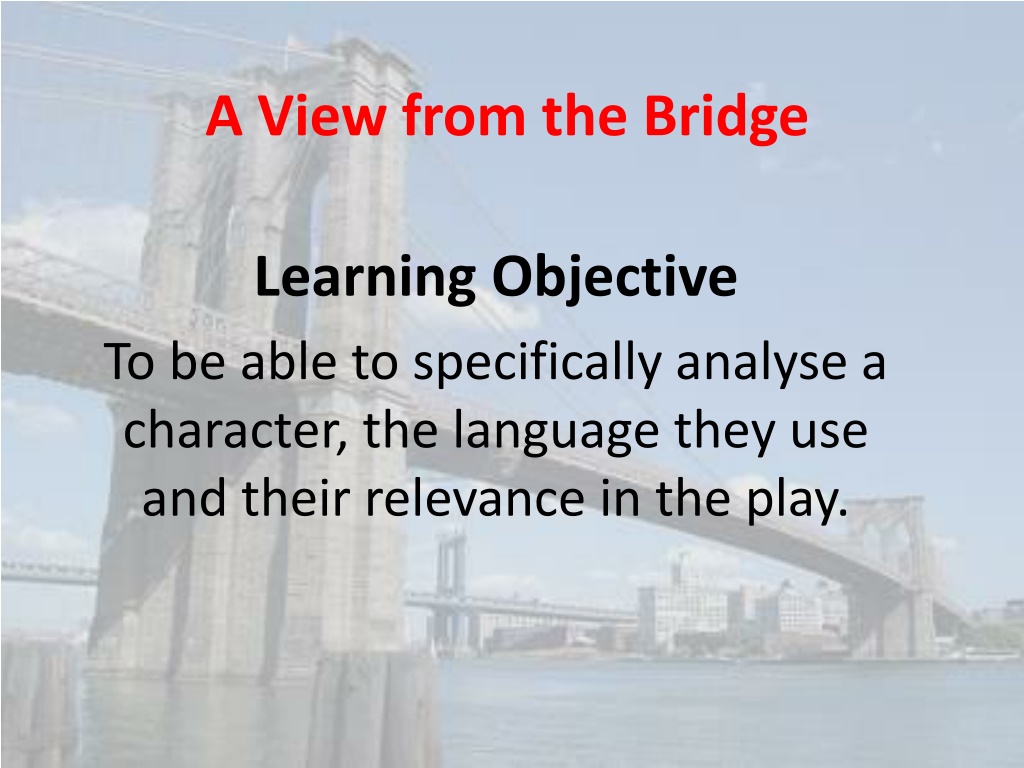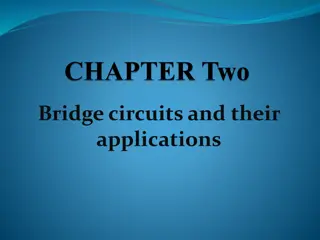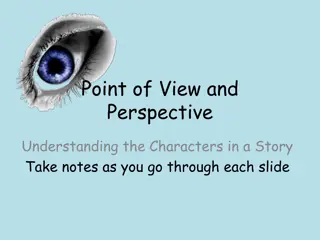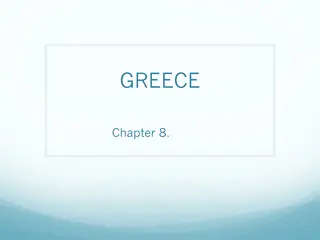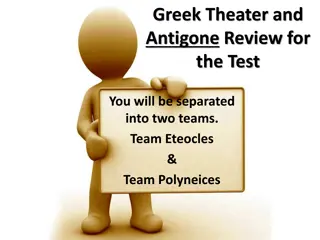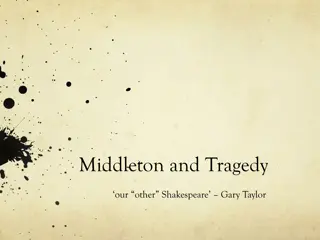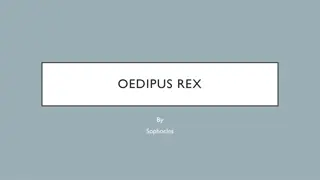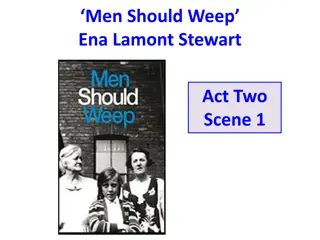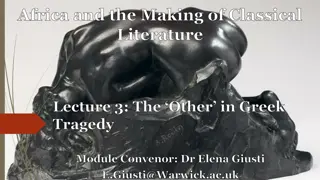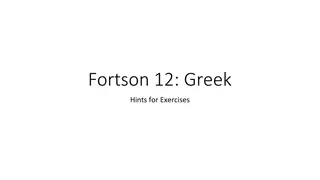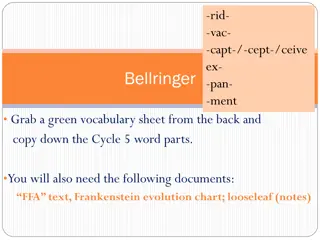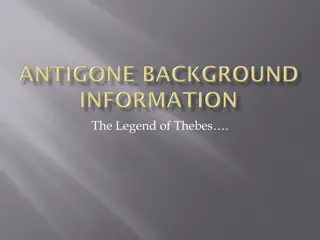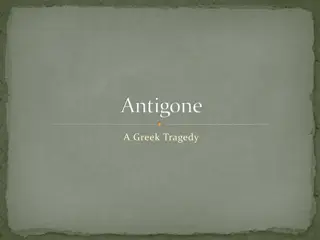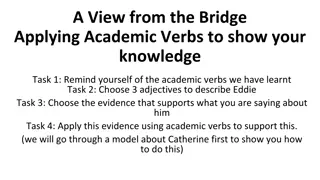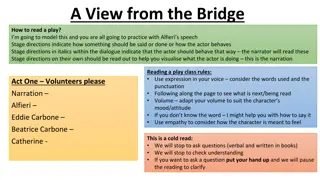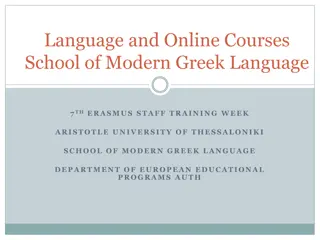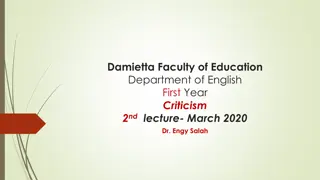Greek Tragedy and the Role of Characters in 'A View from the Bridge'
Greek Tragedy, with its single storyline and protagonist, serves as a backdrop for analyzing characters in 'A View from the Bridge'. Oedipus, a classic tragic hero, is a powerful example of fate's inevitability. The Chorus, represented by Alfieri in the play, guides the audience through narration and commentary. Themes of destiny and consequence intertwine in both genres, revealed through character language and actions.
Download Presentation

Please find below an Image/Link to download the presentation.
The content on the website is provided AS IS for your information and personal use only. It may not be sold, licensed, or shared on other websites without obtaining consent from the author. Download presentation by click this link. If you encounter any issues during the download, it is possible that the publisher has removed the file from their server.
E N D
Presentation Transcript
A View from the Bridge Learning Objective To be able to specifically analyse a character, the language they use and their relevance in the play.
Greek Tragedy Greek tragedies had a single storyline, a single setting and continuous time. It normally contains a male protagonist who would be classed as the tragic hero. The tragic hero s fate was predetermined. They could not escape it, no matter how hard they tried.
Oedipus There was a prophecy, made by the Oracle, about a man that would kill his father and marry with his mother. Thus bring disaster on his family and city. Therefore his parents cast him out as a child to live far away with a lowly couple never to know his family, therefore prove the prophecy untrue.
Oedipus: In a nutshell He came across his father in later life (not knowing that he was his father) and killed him in a brawl. He then saved the city that his father was king of and married the queen (his mother). The truth eventually comes out and Oedipus stabs his eyes out.
You cant escape your fate. No matter what Eddie does, he will not be able to escape his final fate. But he doesn t know it, or can t accept it.
Greek Tragedy uses the CHORUS to tell the story. 1. They inform the audience of the events before the play. 2. Narrate off-stage happenings. 3. Comment on the characters 4. Tell the audience what to think, or at least hinted at it. 5. Often tell the audience what is going to happen. You need to write these bullet points down.
The Chorus in A View From the Bridge The role of the chorus in A View From the Bridge is taken by Alfieri, a local solicitor in the neighbourhood. Alfieri opens the play with a monologue and closes the play with a monologue.
Who is Alfieri? Alfieri is the symbolic bridge between American law and local laws. Alfieri, an Italian- American, is true to his ethnic identity. He is a well-educated man who studies and respects American law, but is still loyal to Italian customs. The play told from the viewpoint of Alfieri. From his vantage point, Alfieri attempts to present an un-biased and reasonable view of the events of the play and make clear the greater social and moral implications in the work. From his narration, it seems that Alfieri has decided to tell the story for his own reasons as much as anyone else's. He does not find a conclusion after telling the Carbone story, but tells it nonetheless and he speaks and reveals his honest view of the facts. Alfieri informs the audience and provides additional commentary on what is happening in the story. The description of the people within the play and narration at the beginning of every scene change helps to distinguish the short chapters of the tale. Alfieri is fairly inconsequential in the action of the play in general, but more importantly frames the play. Alfieri admittedly cannot help Eddie Carbone, but must powerlessly watch the tragic events unfold before him. There is no illusion of reality, Alfieri purposely breaks the fourth wall and talks to the audience during the reenactment of the story. Alfieri is in many ways like Arthur Miller, when he first heard the tale of the Longshoreman. He is the teller of and incredible story that he cannot change.
Alfieris Speech You wouldn t have known it, but something amusing has just happened. You see how uneasily they nod to me? That s because I am a lawyer. In this neighbourhood to meet a lawyer on the streets is unlucky. We re only thought of in connection with disasters, and they d rather not get too close.
Alfieris Speech Starts off on a light note by using the word amusing. You wouldn t have known it, but something amusing has just happened. You see how uneasily they nod to me? That s because I am a lawyer. In this neighbourhood to meet a lawyer on the streets is unlucky. We re only thought of in connection with disasters, and they d rather not get too close.
Alfieris Speech Starts off on a light note by using the word amusing. You wouldn t have known it, but something amusing has just happened. You see how uneasily they nod to me? That s because I am a lawyer. In this neighbourhood to meet a lawyer on the streets is unlucky. We re only thought of in connection with disasters, and they d rather not get too close. A nod shows that he is respected.
Alfieris Speech Starts off on a light note by using the word amusing. You wouldn t have known it, but something amusing has just happened. You see how uneasily they nod to me? That s because I am a lawyer. In this neighbourhood to meet a lawyer on the streets is unlucky. We re only thought of in connection with disasters, and they d rather not get too close. A nod shows that he is respected. A lawyer is important, but shows that he has also witnessed a lot of conflict.
Alfieris Speech Starts off on a light note by using the word amusing. You wouldn t have known it, but something amusing has just happened. You see how uneasily they nod to me? That s because I am a lawyer. In this neighbourhood to meet a lawyer on the streets is unlucky. We re only thought of in connection with disasters, and they d rather not get too close. A nod shows that he is respected. A lawyer is important, but shows that he has also witnessed a lot of conflict. His mood begins to change, hinting that bad things may happen.
What does this tell us about Crime? I am inclined to notice the ruins in things, perhaps because I was born in Italy... I only came here when I was twenty-five. In those days, Al Capone, the greatest Carthaginan of all, was learning his trade on these pavements, and Frankie Yale himself was cut precisely in half by a machine-gun on the corner of Union Street, two blocks away. Oh, there were many here who were justly shot by unjust men. Justice is very important here.
What does this tell us about the area and the people who live in it? But this is Red Hook, not Sicily. This is the slum that faces the bay on the seaward side of Brooklyn Bridge. This is the gullet of New York swallowing the tonnage of the world. And we are quite civilised, quite American. Now we settle for settle for half, and like it better. I no longer keep a pistol in my filing cabinet. And my practice is entirely unromantic.
What does this tell us about what we are going to see? and yet... every few years there is still a case, and as the parties tell me what the trouble is, the flat air in my office suddenly washes in the brown scent of the sea, the dust in the air is blown away and the thought comes in that some Caeser s year, in Calabria perhaps or on the cliff a Syracuse, another lawyer, quite differently dressed, heard the same complaint and sat there as powerless as I, and watched it run its bloody course.
The American Dream How does what we have looked at today; Greek Tragedy The role of Alfieri Alfieri s opening monologue .....relate to The American Dream as an ideal of something that should be strived for?
The American Dream An American ideal of a happy and successful life to which all may aspire: In the deepening gloom of the Depression, the American Dream represented a reaffirmation of traditional American hopes
The final monologue of the play. Most of the time now we settle for half and I like it better. But the truth is holy, and even as I know how wrong he was, and his death useless, I tremble, for I confess that something perversely pure calls to me from his memory not purely good, but himself purely, for he allowed himself to be wholly known and for that I think I will love him more than all of my sensible clients. And yet, it is better to settle for half, it must be! And so I mourn him I admit it- with a certain ... alarm.
What is Alfieri saying? About Eddie Carbone?
What is Alfieri saying? About Eddie Carbone? About people in general?
Eddies Life What makes it the American Dream? Catherine (his niece) Beatrice (his wife) Eddie Carbone
Eddies Life What breaks it from the American Dream? Catherine (his niece) Beatrice (his wife) Eddie Carbone
